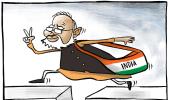'But the world would be much poorer without economics' contribution to understanding how societies function and without economists’ suggestions as to how politicians might improve them.
'And economists themselves could do wonders by simply incorporating the country-specific factors in their econometric models rather than just applying them in toto," say Soumya Kanti Ghosh and Samir K Jha.

Since the global financial crisis, there have been serious doubts about the theory that the economy functions best with “invisible hand” and it should not be jeopardised through government “intervention”.
In particular, the discipline (read economics) has somehow rejected the pattern of simple policy prescriptions -- that any standard economics textbook imbibes.
At the outset, it can be put on record that just as it is important not to overstate what economics can do, it is critical not to understate it.
After all, who would expect to predict global outcomes that depend on the individual actions of about five billion working-age individuals, not to mention the intervention of natural and man-made disasters?
While this is true, it is also true that economics provides the essential tools for understanding, and to some degree, shaping those events.
Herein lies the crux of the problem.
Such understanding often results in economists limiting their options by reducing their subject to a set of issues that could be modelled.
In the process, they are committed to their methods and beliefs that any further movement in the economy, new problems or new topics of interest, are more likely to sit outside their self-defined purview than within.
Most of the times, the experts get tempted, therefore, to bang such new problems into shapes to redefine them as per their own predetermined mindset.
Another difficulty that impacts economics as a subject is the fact that the future is inherently uncertain: it cannot be calculated.
A lot of human behaviour and some fundamental economic institutions -- the desire to hold money, for example -- are the result of this fact.
Let us again begin with what happened after the financial crisis.
In 2011, when the unemployment rate was 9 per cent, Reinhart and Rogoff had explained that “current debt trajectories are a risk to long-term growth and stability, with many advanced economies already reaching or exceeding the important marker of 90 per cent of GDP”.
However, even eight years down the line, there has been no such tipping point.
However, that did not stop one from arguing that the main threat to the economy was spiralling debt and a resulting spike in interest rates that would lead to the crowding out of private investment and a stagflation crisis of the type experienced in the 1970s.
Such warnings miserably failed to come true but it did not stop the misplaced policies of fiscal austerity.
If we look at Greece, it is a classic example of secular stagnation.
In fact, Greece were to undergo heavy austerity but did not walk down that path and currently yields are at 2 per cent.
Sadly, this crowding out argument has gained enormous precedence in India too.
This was clearly evident in a speech by former RBI Deputy Governor Viral Acharya just a few days back.
As economists, we have been now following this debate for ages that combined savings of the government is crowding out private sector investment in India.
At the same time, we are also witness to the rising noises about slowing down of growth in India due to falling demands.
Simple economics suggests these two cannot co-exist.
If growth is demand constrained, increase in private investment will only lead to higher output.
And, a part of the higher output will be saved and, in return, will be sufficient to support private investment.
Fact is, only when growth is capacity constrained, which apparently is not the case right now in India, any idea of crowding out can be deemed relevant.
Similarly, government borrowings pushing up interest rate is also being pointed out, again mostly by the same set of experts who are making the noises about crowding out.
But again, we need to keep in mind the fact that the government borrowings are the additional flow demand, while interest rates are, primarily determined by stock demand and supply of funds.
Instances like the above, quite justifiably, force those with not much interest in the debate to conclude (rightfully?) that economics is just a way for the economists and their brethren to rationalise what they already believe.
However, the problem is also in the other direction, that is, misguided fiscal adventurism that had played spoilsport in a country like India.
But again, the link between a higher fiscal deficit and inflation or CAD seems to have broken down in recent years.
Importantly, Dr Acharya’s paper rightfully argues that market players pick up government debt when private debt is risky; that is exactly what is happening now.
However, this cannot be called crowding out as claimed in the paper.
Additionally, a jump in government debt results in a decline in private debt, clearly implying we are in a demand constrained economy.
Let us also consider the example of monetary policy. Even after years of quantitative easing (QE) and ultra-low interest rates, advanced economies -- particularly the Eurozone -- have continued to undershoot even the minimum inflation targets.
Thus the long-standing assumptions about downward nominal wage rigidity of the '60s and '70s when organised labour were much stronger is clearly not in vogue now.
Employees are willing to work even at a lower wage rate explaining much of the slower growth in labour productivity and a breakdown of the Phillips curve. We are witnessing similar situation in India right now with minimum wage growth and declining productivity.
Another big theoretical assumption, particularly at the micro level, is how strong profit growth will attract new entrants to the market, encouraging more investment.
But in recent times, corporate profits and market concentration are both on the rise.
To sum up, knocking economics has become a popular sport, even within the profession.
But the world would be much poorer without its contribution to understanding how societies function and without economists’ suggestions as to how politicians might improve them.
And economists themselves could do wonders by simply incorporating the country-specific factors in their econometric models rather than just applying them in toto.
Soumya Kanti Ghosh is group chief economic advisor and Samir K Jha is assistant general manager AGM, SBI.












 © 2025
© 2025